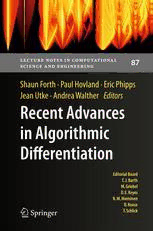
Recent Advances in Algorithmic Differentiation PDF
Preview Recent Advances in Algorithmic Differentiation
Lecture Notes in Computational Science 87 and Engineering Editors: TimothyJ. Barth MichaelGriebel DavidE. Keyes RistoM. Nieminen DirkRoose TamarSchlick Forfurthervolumes: http://www.springer.com/series/3527 • Shaun Forth Paul Hovland Eric Phipps (cid:2) (cid:2) Jean Utke Andrea Walther (cid:2) Editors Recent Advances in Algorithmic Differentiation 123 Editors ShaunForth JeanUtke AppliedMathematics MathematicsandComputerScience andScientificComputing Division CranfieldUniversity ArgonneNationalLaboratory Shrivenham Argonne Swindon Illinois UnitedKingdom USA PaulHovland AndreaWalther MathematicsandComputerScience DepartmentofMathematics Division UniversityofPaderborn ArgonneNationalLaboratory Paderborn Argonne Germany Illinois USA EricPhipps SandiaNationalLaboratory Albuquerque NewMexico USA ISSN1439-7358 ISBN978-3-642-30022-6 ISBN978-3-642-30023-3(eBook) DOI10.1007/978-3-642-30023-3 SpringerHeidelbergNewYorkDordrechtLondon LibraryofCongressControlNumber:2012942187 MathematicsSubjectClassification(2010):65D25,90C30,90C31,90C56,65F50,68N20,41A58, 65Y20 (cid:2)c Springer-VerlagBerlinHeidelberg2012 Thisworkissubjecttocopyright.AllrightsarereservedbythePublisher,whetherthewholeorpartof thematerialisconcerned,specificallytherightsoftranslation,reprinting,reuseofillustrations,recitation, broadcasting,reproductiononmicrofilmsorinanyotherphysicalway,andtransmissionorinformation storageandretrieval,electronicadaptation,computersoftware,orbysimilarordissimilarmethodology nowknownorhereafterdeveloped.Exemptedfromthislegalreservationarebriefexcerptsinconnection with reviews or scholarly analysis or material supplied specifically for the purpose of being entered and executed on a computer system, for exclusive use by the purchaser of the work. Duplication of this publication or parts thereof is permitted only under the provisions of the Copyright Law of the Publisher’slocation,initscurrentversion,andpermissionforusemustalwaysbeobtainedfromSpringer. PermissionsforusemaybeobtainedthroughRightsLinkattheCopyrightClearanceCenter.Violations areliabletoprosecutionundertherespectiveCopyrightLaw. Theuseofgeneraldescriptivenames,registerednames,trademarks,servicemarks,etc.inthispublication doesnotimply,evenintheabsenceofaspecificstatement,thatsuchnamesareexemptfromtherelevant protectivelawsandregulationsandthereforefreeforgeneraluse. While the advice and information in this book are believed to be true and accurate at the date of publication,neithertheauthorsnortheeditorsnorthepublishercanacceptanylegalresponsibilityfor anyerrorsoromissionsthatmaybemade.Thepublishermakesnowarranty,expressorimplied,with respecttothematerialcontainedherein. Printedonacid-freepaper SpringerispartofSpringerScience+BusinessMedia(www.springer.com) Preface The Sixth International Conference on Automatic Differentiation (AD2012) held July 23–27, 2012, in Fort Collins, Colorado (USA), continued this quadrennial conferenceseries.Whilethefundamentalideaofdifferentiatingnumericalprograms is easy to explain, the practical implementation of this idea for many nontrivial numerical computations is not. Our community has long been aware of the discrepancybetweentheaspirationofanautomaticprocesssuggestedbythename automatic differentiation and the reality of its practical use, which often requires substantialeffortfromthe user. New algorithmsandmethodsimplementedin dif- ferentiationtoolsimprovetheirusabilityandreducetheneedforuserintervention. On the other hand, the demands to compute derivatives for numerical models on parallel hardware, using a wide variety of libraries and having components implementedindifferentprogramminglanguages,posenewchallenges,particularly for the efficiency of the derivativecomputation.These challenges, as well as new applications,havebeendrivingresearchforthepastfouryearsandwillcontinueto doso.Despiteretainingautomaticdifferentiationintheconferencename,theeditors purposely switched to algorithmic differentiation (AD) in the proceedings title. Thus,theconferenceproceedingsfollowsomewhatbelatedlythemoreappropriate namingchosenbyAndreasGriewankforthefirsteditionofhisseminalmonograph coveringoursubjectarea.ThisnamebetterreflectstherealityofADusageandthe researchresultspresentedinthepaperscollectedhere. The31contributedpaperscovertheapplicationofADtomanyareasofscience and engineering as well as aspects of AD theory and its implementation in tools. Forallpapersthereferees,selectedfromtheprogramcommitteeandthewiderAD community, as well as the editors have emphasized accessibility of the presented ideasalsotonon-ADexperts. IntheADtoolsarenanewimplementationsareintroducedcovering,forexample, Java and graphical modeling environments, or join the set of existing tools for Fortran.NewdevelopmentsinADalgorithmstarget:efficientderivativesformatrix- operation,detection and exploitationof sparsity, partialseparability,the treatment ofnonsmoothfunctions,andotherhigh-levelmathematicalaspectsofthenumerical computationstobedifferentiated. v vi Preface ApplicationsstemfromtheEarthsciences,nuclearengineering,fluiddynamics, and chemistry, to name just a few. In many cases the applications in a given area of science or engineering share characteristics that require specific approaches to enable AD capabilities or provide an opportunity for efficiency gains in the derivative computation. The description of these characteristics and of the tech- niques for successfully using AD should make the proceedings a valuable source ofinformationforusersofADtools. Theimageonthebookcovershowsthe high-harmonicemissionspectrumofa semiconductorquantumdotfordifferentexcitationconditions.Tofavorspecificfre- quenciesonehastofindanappropriateinputpulsewithinalargeparameterspace. Thiswasaccomplishedbycombiningagradient-basedoptimizationalgorithmwith AD.ThedataplotswereprovidedbyMatthiasReichelt. Algorithmicdifferentiationdrawsonmanyaspectsof appliedmathematicsand computer science and ultimately is useful only when users in the science and engineering communities become aware of its capabilities. Furthering collabora- tions outside the core AD community, the AD2012 program committee invited leading experts from diverse disciplines as keynote speakers. We are grateful to LorenzBiegler(CarnegieMellonUniversity,USA),LucaCapriotti(CreditSuisse, USA),DonEstep(ColoradoStateUniversity,USA),AndreasGriewank(Humboldt University,Germany),MaryHall(UniversityofUtah,USA),BarbaraKaltenbacher (University of Klagenfurt, Austria), Markus Pu¨schel (ETH Zurich, Switzerland), andBertSpeelpenning(MathPartners,USA)foracceptingtheinvitations. We want to thank SIAM and the NNSA and ASCR programs of the US DepartmentofEnergyfortheirfinancialsupportofAD2012. Albuquerque,Chicago ShaunForth Paderborn,Shrivenham PaulHovland April2012 EricPhipps JeanUtke AndreaWalther Preface vii ProgramCommitteeAD2012 BradBell,UniversityofWashington(USA) MartinBerz,MichiganStateUniversity(USA) ChristianBischof,TUDarmstadt(Germany) MartinBu¨cker,RWTHAachen(Germany) BruceChristianson,UniversityofHertfordshire(UK) DavidGay,AMPLOptimizationInc.(USA) AndreasGriewank,HumboldtUniversityBerlin(Germany) LaurentHascoe¨t,INRIA(France) PatrickHeimbach,MassachusettsInstituteofTechnology(USA) KoichiKubota,ChuoUniversity(Japan) KyokoMakino,MichiganStateUniversity(USA) Jens-DominikMu¨ller,QueenMaryUniversityofLondon(UK) UweNaumann,RWTHAachen(Germany) BoyanaNorris,ArgonneNationalLaboratory(USA) TrondSteihaug,UniversityofBergen(Norway) • Contents ALeibnizNotationforAutomaticDifferentiation............................ 1 BruceChristianson SparseJacobianConstructionforMappedGridVisco-Resistive Magnetohydrodynamics......................................................... 11 DanielR.ReynoldsandRaviSamtaney Combining Automatic Differentiation Methods for High-DimensionalNonlinearModels.......................................... 23 JamesA.Reed,JeanUtke,andHanyS.Abdel-Khalik ApplicationofAutomaticDifferentiationtoanIncompressible URANSSolver.................................................................... 35 EmreO¨zkaya,AnilNemili,andNicolasR.Gauger ApplyingAutomaticDifferentiationtotheCommunityLandModel...... 47 Azamat Mametjanov,Boyana Norris, Xiaoyan Zeng, Beth Drewniak,JeanUtke,MihaiAnitescu,andPaulHovland UsingAutomaticDifferentiationtoStudytheSensitivityofa CropModel....................................................................... 59 ClaireLauvernet,LaurentHascoe¨t,Franc¸ois-XavierLeDimet,and Fre´de´ricBaret EfficientAutomaticDifferentiationofMatrixFunctions.................... 71 PederA.Olsen,StevenJ.Rennie,andVaibhavaGoel Native Handling of Message-Passing Communicationin Data-FlowAnalysis .............................................................. 83 Vale´riePascualandLaurentHascoe¨t IncreasingMemory Localityby ExecutingSeveralModel InstancesSimultaneously........................................................ 93 RalfGieringandMichaelVoßbeck ix x Contents AdjointModeComputationofSubgradientsforMcCormick Relaxations........................................................................ 103 MarkusBeckers,ViktorMosenkis,andUweNaumann EvaluatinganElementoftheClarkeGeneralizedJacobianof aPiecewiseDifferentiableFunction............................................ 115 KamilA.KhanandPaulI.Barton The ImpactofDynamicDataReshapingonAdjointCode GenerationforWeakly-TypedLanguagesSuchasMatlab.................. 127 JohannesWillkomm,ChristianH.Bischof,andH.MartinBu¨cker OntheEfficientComputationofSparsityPatternsforHessians........... 139 AndreaWalther ExploitingSparsityinAutomaticDifferentiationonMulticore Architectures ..................................................................... 151 BenjaminLetschert,KshitijKulshreshtha,AndreaWalther,Duc Nguyen,AssefawGebremedhin,andAlexPothen AutomaticDifferentiationThroughtheUseofHyper-Dual NumbersforSecondDerivatives ............................................... 163 JeffreyA.FikeandJuanJ.Alonso ConnectionsBetweenPowerSeriesMethodsandAutomatic Differentiation.................................................................... 175 DavidC.Carothers,StephenK.Lucas,G.EdgarParker,JosephD. Rudmin,JamesS.Sochacki,RogerJ.Thelwell,AnthonyTongen, andPaulG.Warne HierarchicalAlgorithmicDifferentiationACaseStudy..................... 187 JohannesLotz,UweNaumann,andJo¨rnUngermann StoringVersusRecomputationonMultipleDAGs ........................... 197 HeatherCole-Mullen,AndrewLyons,andJeanUtke UsingDirectedEdgeSeparatorstoIncreaseEfficiencyinthe DeterminationofJacobianMatricesviaAutomaticDifferentiation ....... 209 ThomasF.Coleman,XinXiong,andWeiXu AnIntegerProgrammingApproachtoOptimalDerivative Accumulation..................................................................... 221 JieqiuChen,PaulHovland,ToddMunson,andJeanUtke TheRelativeCostofFunctionandDerivativeEvaluationsin theCUTErTestSet .............................................................. 233 TorstenBosseandAndreasGriewank JavaAutomaticDifferentiationToolUsingVirtualOperator Overloading....................................................................... 241 PhuongPham-QuangandBenoitDelinchant
